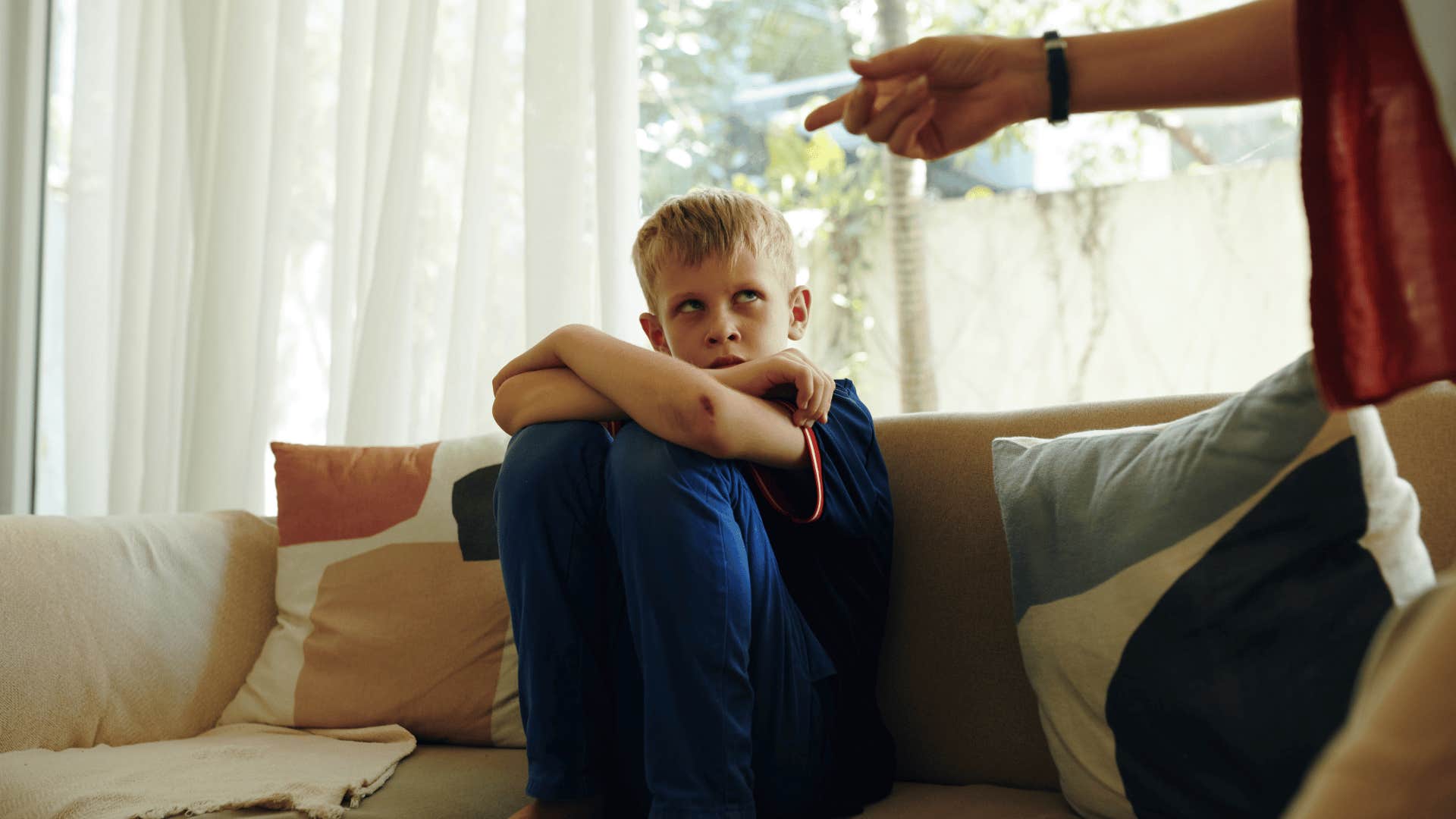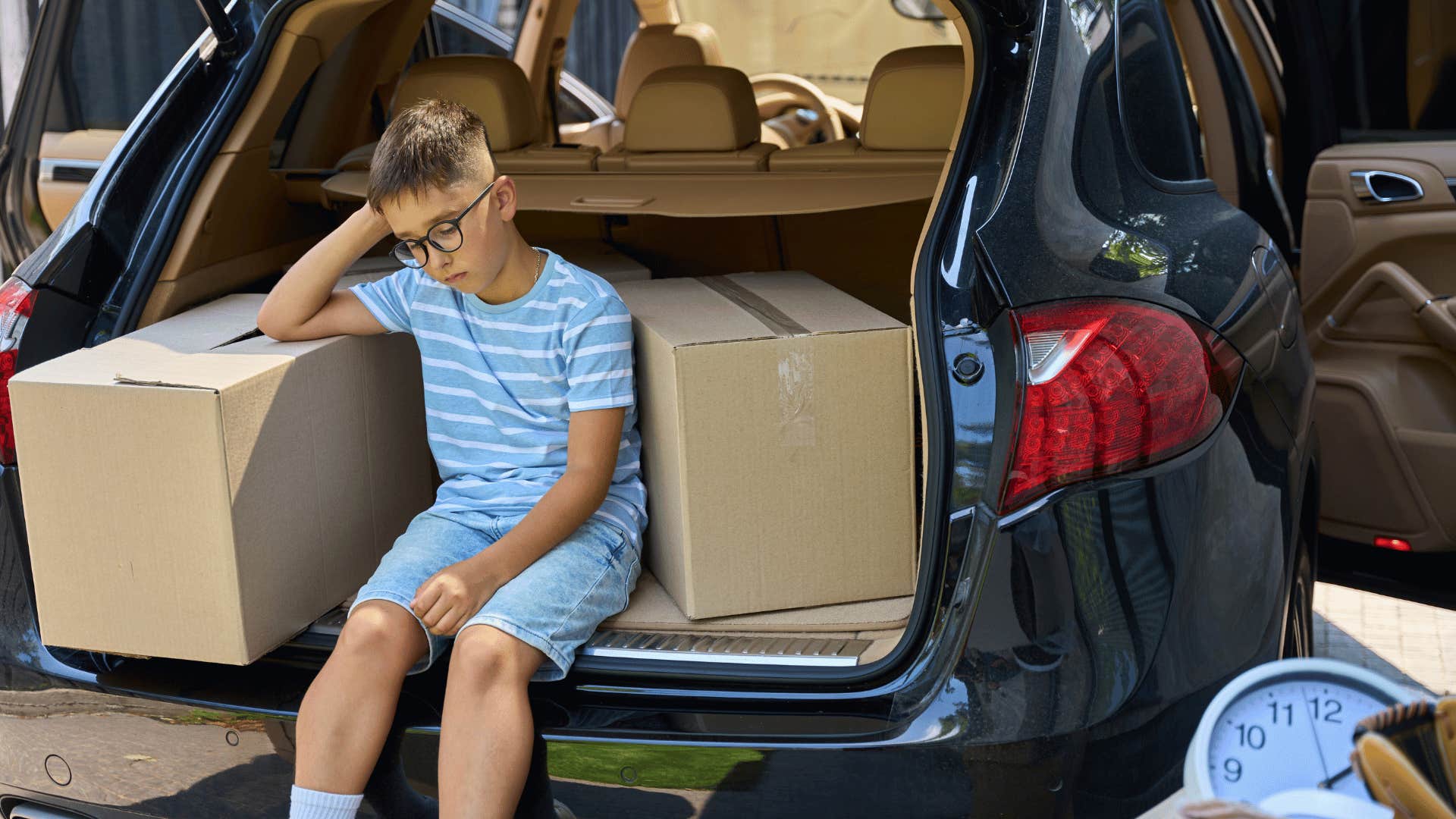People Who Blame Themselves For Everything Usually Had These 11 Childhood Experiences
Negative childhood experiences can have a major impact on your self-blaming tendencies.
 PeopleImages.com - Yuri A | Shutterstock
PeopleImages.com - Yuri A | Shutterstock Individuals who struggle with their self-confidence and self-worth may have often grown up in environments that actively prevented them from being able to express themselves without judgment. As adults, they may now struggle with constantly blaming themselves for things that aren't even nowhere near their fault, but it's only because they were conditioned to believe that their worth and happiness lie in being perfect and gaining the approval of others.
Whatever the case may have been, there are specific childhood experiences people who blame themselves for everything usually had. Much of growing up was marked by inconsistent behavior from their parents, and if you're being raised in an environment where your parents are emotionally immature or stunted, it has a direct impact on how you show up in the world as an adult. It's only through recognizing these patterns and being aware of the invisible scars left by your parents that you'll be able to heal and overcome this mindset.
Here are 11 childhood experiences people who blame themselves for everything usually had
1. Absent or unpredictable caregivers
 Monkey Business Images | Shutterstock
Monkey Business Images | Shutterstock
If you grew up in a home where your parents or caregivers were constantly failing to show up in the ways that mattered or were inconsistent in their attention, affection, or care, it could end up leaving a lasting effect on your confidence and emotional development. If a child feels they need to work extra hard for their parent's love and approval, it turns into them thinking that's how love is given in every other interaction.
"Nothing damages a person's self-concept more thoroughly than neglect. The child feels invisible and unloved, spurring the child to continually fill a bucket that contains a gaping hole," explained clinical psychologist Mary Ann Little, PhD. "There aren't enough blue ribbons, first-place trophies, or surface-level relationships to fill that bucket because the basic foundation is lacking. Still, the child often grasps at such things."
It's unfortunate and causes adults to constantly wonder if they're the problem when relationships or situations don't go as they would have hoped. No matter how much they achieve, they'll always be hard on themselves as a result of childhood experiences people who blame themselves for everything usually had.
2. Being overly criticized by parents
 BearFotos | Shutterstock
BearFotos | Shutterstock
Individuals who spent the majority of their childhood being overly criticized by their parents most likely struggle with self-worth. It's mostly from growing up and hearing that they were never enough, no matter how hard they tried to win their parents' approval.
As a result of being raised with this mindset, as adults they're deeply afraid of failure and have an overwhelming need for validation from others. It's to the point where they constantly assume responsibility for anything that doesn't work out, even if they didn't have a hand in it. This cycle of striving for perfection means that they're unable to accept their flaws and mistakes, even if it's just part of being a human.
"Caretakers' regularly criticizing their child so that, presumably, the child will be successful in enacting their parents' values is, at best, wrong-headed. At its worst, it's destructive of the child's building their confidence and self-esteem," insisted clinical psychologist Leon F. Seltzer, PhD.
3. Being given too much responsibility for family matters
 fizkes | Shutterstock
fizkes | Shutterstock
When a child is burdened with the sense of responsibility during their adolescence, especially for things that shouldn't involve them, including family disputes or being forced to parent their younger siblings, they end up developing a distorted view of relationships. These individuals end up growing up thinking they need to put others before themselves while also having trouble asking for help or support.
"They have to figure out how to cope with their own feelings, trauma, and growing-up experiences. They don't have attentive and loving parents to offer encouragement, guidance, comfort, or validation," licensed psychotherapist Sharon Martin explained. "They feel alone, overwhelmed, scared, and angry. Often, they have to give up their own friends, interests, and goals because they are so busy caretaking and filled with shame and unworthiness."
4. Emotional manipulation from their parents
 Dragon Images | Shutterstock
Dragon Images | Shutterstock
Being emotionally manipulated is one of the negative childhood experiences people who blame themselves for everything usually had. As it turns out, children who were heavily emotionally manipulated by their parents or caregivers end up growing up with a deep sense and habit of self-blame.
This mindset ends up being incredibly damaging for kids, and the child can end up being guilt-tripped or gaslit into thinking their behavior is directly responsible for their parent's happiness.
"Parenting is about setting expectations and standards for your child and then holding him to them. That is, setting guidelines for daily routines, for how you speak with each other, how to express sadness, anger, or disappointment," clinical licensed psychologist Liz Nissim-Matheis, PhD revealed. "It's also about the emotional space you provide in your home and your tolerance for anger, sadness, fear, and disappointment. It's also about raising those standards over time as your child grows."
As adults, individuals who grew up being emotionally manipulated end up struggling with a distorted view of what's expected of them from others.
5. Witnessing constant conflict between their parents
 PeopleImages.com - Yuri A | Shutterstock
PeopleImages.com - Yuri A | Shutterstock
Children who were forced to witness their parents constantly arguing and were made to feel as if they were the cause of the tension end up growing up and struggling with blaming themselves for everything. As a result, sometimes children feel as if they need to choose a side and may feel that it's all their fault that their parents aren't able to get along.
"Being exposed to parental fighting increases the chances that kids will treat others with hostility," explained psychotherapist Amy Morin, LCSW. "Children may also struggle to maintain healthy relationships as adults if they've grown accustomed to family discord, or they may struggle to identify who they can trust in life."
Having a front-row seat to parental conflicts can truly leave emotional scars that can take years to heal from. That's why it's important for individuals who grew up in this kind of environment to recognize the impact of their experience.
6. Receiving no praise or encouragement
 Media_Photos | Shutterstock
Media_Photos | Shutterstock
When a child grows up with a lack of praise and acknowledgment, it can cause them to feel as if they need to constantly prove their worth and take things personally when it doesn't work out. As adults, these individuals may even struggle to receive compliments and positive feedback because they feel unworthy of the recognition.
Research has shown that parents giving their children praise generally has a positive impact on them. It's associated with improved academic performance and increased brain matter in areas of the brain associated with empathy, open-mindedness, and conscientiousness.
Ultimately, the absence of praise from parents can truly shape a person's belief about themselves. It really impacts how they show up in the world and how they show up for the people around them as well.
7. Not being allowed to make mistakes
 Evgeny Atamanenko | Shutterstock
Evgeny Atamanenko | Shutterstock
Children who grew up in a bubble and were constantly coddled by their parents may experience difficulty with self-blame tendencies. It's usually because they weren't allowed to make mistakes, acknowledge them, and eventually learn and grow from those mistakes.
A child being able to mess something up is crucial for developing a sense of self. Since they were never able to build their own confidence through getting something wrong, as adults these individuals may rely heavily on others to make decisions for them. They're so fearful of disappointing someone that they'll often avoid the initiative altogether.
8. Not being able to express or process their emotions
 Gladskikh Tatiana | Shutterstock
Gladskikh Tatiana | Shutterstock
The one thing that can stay with a child well into adulthood is not being raised in an environment that allowed them to freely express or process their emotions. As one of the most pivotal childhood experiences people who blame themselves for everything usually had, as they grow older, they may struggle with being able to trust others and even second-guess their feelings or constantly feel as if they're "overreacting."
By suppressing their emotions, they'll often immediately blame themselves when something goes wrong because they were never taught to sit in that discomfort or explore their feelings because they're valid. Ultimately, it's hard to untangle this mindset because of how ingrained it is in their sense of self.
9. Constantly moving around
 YAKOBCHUK VIACHESLAV | Shutterstock
YAKOBCHUK VIACHESLAV | Shutterstock
When a child grows up in an unstable environment, especially if it consists of them always moving around and never having a proper home, it can make them feel a bit responsible for that instability. They're constantly being put in positions of having to adapt, change, and conform without warning or support. Over time, they start to believe that they may not deserve stability.
In fact, research from the American Psychological Association found that kids who move around frequently tend to have a poor quality of life down the road. "We know that children who move frequently are more likely to perform poorly in school and have more behavioral problems," Shigehiro Oishi, PhD, lead author of the study, revealed.
Especially if they weren't given clear and proper explanations for why they were constantly having to move around, it may be easy for them to blame themselves for the chaos. Now, as adults, they may struggle with feeling safe in any environment or space.
10. An expectation to always be perfect
 Dikushin Dmitry | Shutterstock
Dikushin Dmitry | Shutterstock
There is no such thing as perfection, and when kids grow up in a home that expects that from them, they start to believe everything is their fault because they haven't achieved the level of perfection that's being demanded from them. This not only causes self-blaming tendencies, but adults who were raised with this belief end up struggling with their confidence.
Everything needs to be perfect because that's what they were taught is the only way to gain approval as kids. But putting this unnecessary expectation on a child will only ruin their sense of self and make them think that no one will accept them unless they have an impressive number of accolades to show.
11. Their sibling being the 'preferred child'
 Dasha Petrenko | Shutterstock
Dasha Petrenko | Shutterstock
Parental favoritism is one of the unfortunate childhood experiences people who blame themselves for everything usually had. While it's natural and common for parents to have a favorite child, the problem lies in when they make that favorite known amongst their other kids.
By doing this, a child may feel as if it's their fault their parents may not value them in the same way they do with their siblings. They may feel the need to "earn" their parents' love and compassion when it should just be a given.
Research from the Journal of Family Psychology determined that kids are not only fully aware of when their parents prefer a sibling to them, but can suffer from low self-esteem, behavioral problems, anxiety and depression. Additional studies found that this favoritism can drive a wedge between siblings, leading to life-long tension and conflict, and even estrangement.
As adults, these individuals may feel as if they're unworthy of unconditional love unless they reach a certain standard, and may even believe that it's their own fault that they're unable to form meaningful and healthy connections with others.
Nia Tipton is a staff writer with a bachelor's degree in creative writing and journalism who covers news and lifestyle topics that focus on psychology, relationships, and the human experience.

